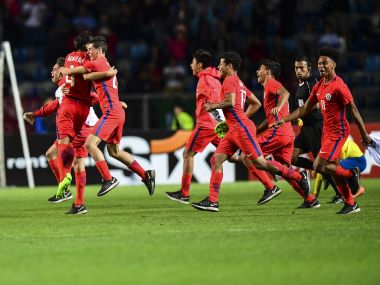Attack may be the clichéd “best form of defence” for many coaches around the world, but Chile’s U-17 coach Hernan Caputto disagrees. His footballing philosophy is simple: “Defend well to attack better.” “We are a team which is capable of a very good defensive organisation. Our slogan is: ‘Defend well to attack better.’ We also believe in direct attacking or counter-attacks and come to the tournament with clear objectives. Our players have typical South American qualities,” Caputto told Firstpost via email ahead of the FIFA U-17 World Cup, which will be held in India from 6 October. “For a coach it is always very important that his team competes by staying true to their philosophy of play. Although in these short tournaments, many times the win is more important, independent of the way it comes about.” [caption id=“attachment_4036203” align=“alignleft” width=“380”] Chile’s players celebrate a win at the 2017 South American U-17 Championship in March. AFP[/caption] His philosophy was evident in the way Chile sealed qualification to the showpiece event — five of the nine matches they played across two group stages in the 2017 South American U-17 Championship, or the Campeonato Sudamericano Sub-17 Chile 2017, ended as 1-0 victories. Two other matches were 1-1 draws. The emphasis was clearly on defensive solidity. That philosophy, however, was left shaken to the bone when Brazil beat them 5-0 to nab the U-17 South American crown. The past few years has been one giddy phase for Chilean football. Not only did the nation win the Copa America title in 2015 — their first ever international title — they repeated the feat in 2016. The inability to add the U-17 South American title to that will surely rankle, but the team has another opportunity to set that right in India. On being asked if his players can fill the boots of the current national team, consisting of players like Alexis Sanchez and Arturo Vidal and widely recognised as the dream generation, in a few years’ time, Caputto said: “Each player has his role in a team and each team has its outstanding players. I want my players to first achieve individual growth so that in the future they can establish themselves for the national team like Vidal and Sanchez have done.” At the moment, just like the Chilean senior national team, the U-17 crop are doing what many of their predecessors could not do. They sealed qualification to the 2017 U-17 World Cup on merit — the first time the South American nation has done so after 1997. They did compete at the last edition, but made it by virtue of hosting the event like current hosts India this time around. Now, the challenge will be to go where not even the so-called golden generation has gone: clinch the U-17 world title. “For me and the coaching staff, the tournament in India will be a very nice challenge, especially after having had a very good South American Championship. Representing the country is a great challenge and for the players too this will be a spectacular experience, an opportunity in which they can show all their capabilities,” Caputto added. That will be easier said than done. Chile have been drawn against teams like Mexico, England and Iraq in what has been dubbed as the
‘Group of Death’ . While Mexico and Iraq are the North American and Asian champions respectively, England were on course to being the European champions but were stunned by Spain in the dying seconds of the UEFA U-17 Championship final. “We are grouped with a very tough team like Mexico and other countries like Iraq and England are equally strong. We know we have the potential but we need to speed up a little. Our team is going to prepare well for the tournament," Caputto said after the draw in Mumbai. The team has subsequently played in multiple exposure tournaments including one in Mexico back in August where the Indian U-17 team was one of the competitors. In their face off, India drew 1-1 with the South Americans. Before the draw, Caputto also travelled with his assistant coaches to check out the youth systems of clubs in Spain and England. “On that trip, we realised that there was not much difference in the way we worked. The differences lie in cultural and sports mentality of the youngsters who are being trained in the youth systems. Therein lies a world of differences.” Just how wide a gulf that is, will only be apparent when the World Cup begins in October.
Chile have been drawn against teams like Mexico, England and Iraq in what has been dubbed as the ‘Group of Death’.
Advertisement
End of Article
Written by Amit Kamath
Amit Kamath is with the sports desk in Mumbai. He covers Olympic sports like wrestling, shooting, and boxing besides also writing about NBA and kabaddi. In 2014, he was declared the runner-up in the sports category at the National RedInk Award for Excellence in Journalism for his story on Sports Authority of India's Kandivli campus where world-class athletes had to put up with appalling conditions. He was a Robert Bosch Media Ambassador in 2019. see more


)

)
)
)
)
)
)
)
)



